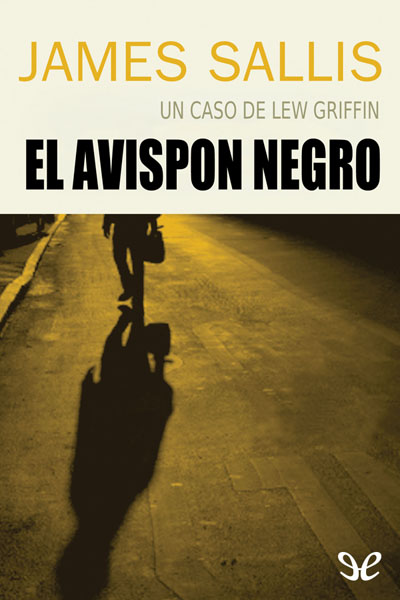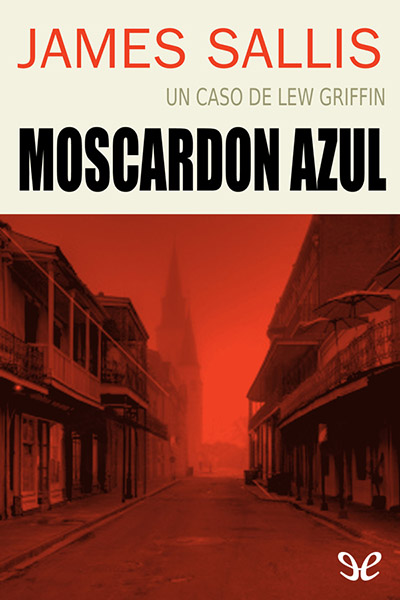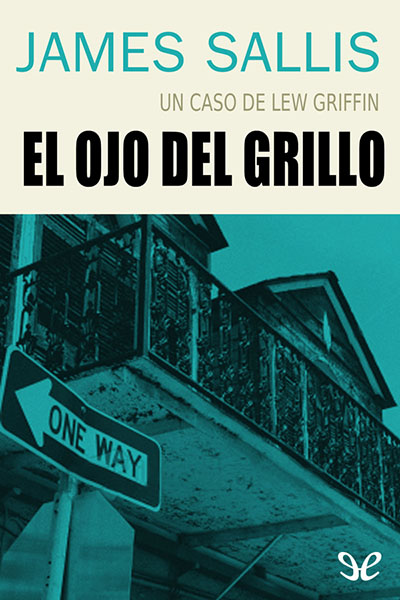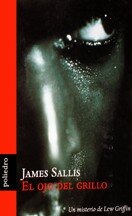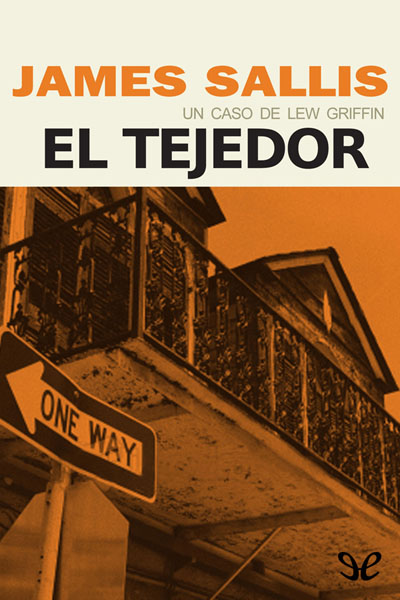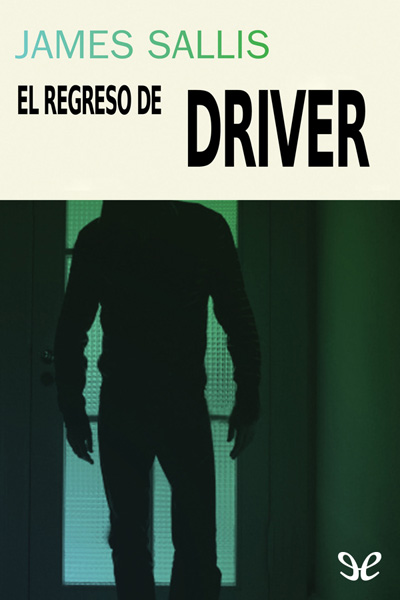oleebook.com
La falena de James Sallis
de James Sallis - GĂ©nero: Italian
Sinopsis
Baby Girl McTell. Nata: 15 settembre. Peso: 600 grammi. Madre: Alouette. Sono i dati della crack baby che Lew Griffin ha rintracciato in un ospedale di Clarksville, nel profondo Sud. Potevo reggerla nel palmo della mano senza problemi. Ci è arrivato cercando Alouette, la figlia che LaVerne voleva rivedere e che Lew si è impegnato a ritrovare. Per pagare almeno in parte il debito con la donna degli anni difficili, l'amore di una vita. Morta, quando sembrava salva. E così Griffin è di nuovo in strada, col cuore pesante e il diavolo alle calcagna. E Griffin dovrĂ scendere ancora di piĂ¹ nell'inferno del passato, per affrontare i propri demoni e la violenza che esplode in lui, mentre cerca di afferrare il fantasma di Alouette e della propria esistenza.
Descargar
Descargar La falena ePub GratisLibros Recomendados - Relacionados
Reseñas Varias sobre este libro
While the first book in James Sallis's Lew Griffin series, The Long-Legged Fly, was essentially a compilation of stories during different decades in Lew's life, the second, Moth, focuses on the time immediately following the events at the end of the 1990 section of that first book (literally picking up right where the last line in Fly left off). Lew has realized that he's too old to be running the streets now and has quit as a private detective and is now a successful mystery author and college French instructor. After a close friend passes, he feels a responsibility to track down her runaway estranged daughter. But if the investigation itself is the most important thing to you when reading a mystery novel, then you might be disappointed in Sallis's rich work.
I found this book to be even more enjoyable than the first. Not only because now I'm more familiar with Lew and Sallis's writing style, but also because I'm discovering how meta, self-referencing, and cyclic these novels might be. Here are some examples:
1) Moth starts off with a line that made me flip back to the last paragraph in the first book with a whole new understanding, as well as more questions! Intriguing.
2) There's a part in this novel where Lew discusses a bad review of his third novel called Black Hornet, which foreshadows Sallis's next book, the third in the series, one that wasn't even written for another couple of years!
3) There's also a scene where Lew interacts with an old Cajun colleague who's also a private investigator named Boudleaux. But wait a minute, the main private eye character in Lew's books is a Cajun named Boudleaux! Hmm...Lew's inspiration perhaps?
Discoveries these make this novel and the potential for the series really fascinating. And obviously means that it's necessary to read the series in order. But even aside from that, Sallis is a lovely writer with a great knack for characterization and for turning a simple mystery into a deeper look at loss, regret, and responsibility. He's gearing up to be one of my favorite authors and I want to tackle all of his work now. And with this book, the Lew Griffin series is gearing up to be an excellent, detailed character piece. While Fly touched on multiple parts of Lew's life, acting an outline for Lew's entire story, Moth and the subsequent books seem to expand more on each specific period, adding more detailed nuance and texture to a larger existential portrait of a complex man. While I never could bring myself to accept Christian notions of sin and atonement, there's definitely something to karma. The things we do pile up on us, weigh us down. Or hold us in place, at the very least. afrocentric author-sallis crime-mystery-thriller ...more28 s Algernon (Darth Anyan)1,599 1,020
Lew Griffin is back, pulled back into the game of finding missing persons and getting his heart broken all over again, just when he thought he had settled down into a more tranquil lifestyle:
- I need a detective, Lew. A good one.
- I don't do that anymore. Hell, I never did it very much. I sat in bars and drank, and eventually guys I was looking for would stumble by and trip on my feet. I'm a teacher now.
- And a writer.
- Yeah, well, that too. Once you've lost your pride, it gets easier, you know: you'll do almost any damn thing. You start off small, a piece for the local paper, or maybe this tiny little story about growing up, something that. That's how they hook you. Then before you know it, you're writing a series for them.
I don't know if there's another P.I. that is also a writer, Lew is in a class of his own for me. In the first book in the series (The Long Legged Fly) I have followed Lew Griffin across decades, from an angry youth to a cynical, heavy drinker wreck, finally parking himself in a steady job, teaching kids about the joys of literature and exorcising his demons through the pages of the books he's writing, instead of fistfights and hard liquor. Book one covered his whole lifetime, boiled down to a few hard kernels of truth to be saved from a long history of failures. I was wondering what is left to be said for an encore.
Moth is the answer, and in some ways it is even better than the debut. For one thing, the plot is a lot more focused, with one major case to investigate instead of scattered episodes. For another, Lew is older and wiser, and more articulate about how he views the world around him and how he positions himself in relation to it and to the people he meets. From his teacher's pulpit, Lew is more open about the philosophical backbone of his storytelling and about the way his favorite writers underline and explain the quandaries he is facing. I have labelled the first novel as 'existentialist noir', and an early mention of Camus, followed by Queneau and Bernhard references appear to support my argument.
Whenever things begin to look absolutely, unremittingly impossible and I find myself sinking into despair for myself and the human race, I read Thomas Bernhard. It always cheers me up. No one is more bitter, no one has ever lived in a bleaker world than Thomas Bernhard.
The world Lew lives in not a lot merrier, and now the aged detective has to cope with the loss of its brightest star. The blurb on the back gives a succint resume o9f the main plot:
One of the very few lights from Lew Griffin's dark and violent past has flickered out. His one-time lover, LaVerne Adams is dead - and her daughter, Alouette, has vanished into a seamy, dead-end world of users and abusers - leaving behind a crack-addicted infant and a mystery.
At the request of his rival, the man whom Verne has chosen as her life companion in her last years, Lew walks again through the mean streets of New Orleans, from drinking homes to drug dealers corners, from homeless shelters to a bleak hospital room where a child only a few weeks old is paying the price of its mother's drug addiction. The investigation turns out to be more about the memories of Lew Griffin, the moments and the people that made him the man he is now, the most important among them LaVerne. He will soon journey outside New Orleans, back to the countryside that he left for New Orleans:
The novel's true protagonist, I tell my students, is always time. With the years, it's gotten easier to say things that without immediately looking over my shoulder or down at the floor. And then, of course, you go on and talk about the flow of time in Proust, about Faulkner's sequestrations of history, about the abrogation of time and history in Beckett.
Time takes Lew back to a difficult relationship with his own father, to a decades long friendship with a New Orleans cop who is now at the end of his tether and is contemplating suicide, to a tentative new romance Lew has going on with another teacher. The plot is revealed in a non-linear way. I am tempted to use the 'stream of conscience' label, but it is closer to a stream of affections and regrets, of feeble hope and bitter disappointments where innocents lose the struggle and all your efforts lead back to the beginning. In order to find Alouette Lew must learn about her past, about why she was separated from her mother, why she later run away from a rich father, why she ended up on the street and a drug addict.
Kierkegaard was right: we understand our lives (to the extent that we understand them at all) only backwards.
I have already noticed in the first novel, and it is made double clear in here: Lew's investigations are personal, they affect him deeply, he cares and he carries the scars of his failures with him over time. His books, his favortite authors might help him understand his plight, but the only consolation is in the rare moments of love from a woman, in the bottle or in the blues albums that he keeps playing in the background of the novel:
Dostoyevsky said that we're all guilty of everything. And while I never could bring myself to accept Christian notions of sin and atonement, there's definitely something to karma. The things we do pile up on us, weigh us down. Or hold us in place, at the very least.
I might have given the impression that nothing much happens in the novel except reminiscing and introspection. It's true there's more than a fair share of this stuff going on, but there are also people to get to know, places to visit, there's bar room brawls and shootouts in gangster hideouts, there's even a rare touch of humor in the way Lew keeps craving and drinking huge quantities of coffee from the start to the finish of the novel. The true story is in the details, in gestures, looks, silences, the kindness of strangers ( the taxi driver who gives a helping hand at three a.m. to a grumpy neighbor), and Sallis demostrates in these details he is more a poet than a crime novelist.
Then I pulled the car to the edge of the lot and sat there breathing in the coffee's dark, earthy smell, feeling its heat and steam on my face, sipping at it from time to time. New Orleans coffee makes most others seem generic, but I was at this moment far, far from home, a wanderer, and could make do.
Besides, for the true believer coffee's a lot what Woody Allen says about sex: the worst he ever had was wonderful.
I was interested, as I am whenever I read one of these depressing 'realistic' crime novels where the good guys lose and go back in the end to their empty lives, what makes them going on, what gives them strength to continue and to keep their moral compass steady. For Lew there is Laverne, his cop friend Walsh, the equally scarred teacher Clare, a tired nurse, that taxi driver, Camus, Sonny Boy Williamson wailing on his harmonica, Robert Johnson running away from his hellhounds ("Sun goin' down, boy, dark gon' catch me here"), his writing that comes in fits and false starts until that one moment when it becomes compulsive:
An hour later I got up and, sitting naked on the side of the bed, improvising abbreviations in my rush to get it all down, scribbled ten pages of notes.
here's a few of the things I've bookmarked in the text to illustrate the balance between the cynic and the romantic in Lew Griffin, the seesaw of emotio from bright skies to deep darkness:
All that stuff about candlelight and the perfect mate and little bells going off, that's what you believe when you're nineteen or twenty maybe, some of us anyway. Then you get a few years on you and you realize that's not the way the world is at all, that's just not how it goes about its business.
But still, one day there she was.
----
You know those Dracula movies you watch every chance you get, Lewis? How he can never see himself in mirrors? Well, that's you, son - that's all of us. We trip across this earth, work and love and raise families and fight for what we think's right, and the whole time we're absolutely invisible. When we're gone, there's no record we were ever even here.
----
How much of what I've become owes to Verne? I was never able to tell her what she meant to me; never really knew, until it was to late. And yet, somehow in all those years we circled and closed on one another binary stars, all those departures and partial returns, somehow, in some indefinable manner, we had held one another up, had been able to climb together (even when apart) out of the wastes of our pasts.
----
Here's what I think in higher flights of fancy. Once there existed beings, a race, a species (call it what you will) who truly belonged to this world. Then at some point, for whatever reason, they moved on, and we moved into their places. We go on trying to occupy those places, day after endless day. But we'll always remain strangers here, all of us. And for all our efforts, whatever dissimulation we attempt, we'll never quite fit.
I have saved the best for last, that kernel of wisdom that maybe I could save from all the failures, a short exchange as Lew and Walsh discuss famous last words:
- What would you scratch out, Lew?
- Something from a poem I read a while back, I think: "find beauty, try to understand, survive."
201522 s Josh1,690 161
The Lew Griffin books are character driven stories which put depth and meaning ahead of the criminal element. In Moth, Griffin, less the private detective, more the acclaimed author and educator is pulled back into the seedy underworld of the lone wolf detective business when his former flame, Verne passes away leaving behind a daughter Lew knew nothing of.
The daughter isnÂ’t LewÂ’s but it doesnÂ’t stop him searching for her as if she was. Along the way he discovers her drug addiction and deep dive into depravity while also finding answers about himself he didnÂ’t know he was looking for as past and present fuse in an interesting, albeit slowly moving, novel.
Towards the later stages of the novel, Sallis gives Lew a stock standard case which, drug dependencies aside, has little in common with the main plot but it does round out the story well to leave more of that tried and true formulaic P.I novel flavor.
My rating: 3.5/5, not as good as The Long Legged Fly, but a nice addition to the Lew Griffin series. audio_books book_book private_detective ...more18 s Toby843 360
“The things we do pile up on us, weigh us down. Or hold us in place, at very least.”
There are series characters that are put through the wringer mentally and physically specifically to titillate the reader, Lew Griffin is not one of them. When James Sallis decides to have Lew go in to the dark places of the soul with the distinct possibility that he will not emerge unharmed it is written with such skill, heart and precision that it represents the natural progression for the character, and when Griffin is beaten, shot, stabbed etc. it is not the harmless pain that seems to befall our action heroes who can shrug off physical torture with a few witty quips instead he spends an awful lot of time recuperating, he puts himself in to these positions time and time again, knowing that he could die but not caring, drawn to the lifestyle he has struggled to leave behind the moth to the flame.
That casual use of the title of this second Lew Griffin novel was deliberate of course, and it is not just a reference to the behaviour of the protagonist, the theme is repeated through the lives of several characters involved in the main investigation in to the whereabouts of a long lost daughter of an old flame. Sallis is demonstrating that each human animal is drawn in one direction and whilst some of us think we're flying away from an undesirable end the reality is that more often than not we cannot escape the glowing blue light in the fast food kitchen of life.
Once more throughout a brief easy to read novel James Sallis demonstrates his abilities as an intelligent writer sensitive to the world around him, creating a special noir protagonist and fully realised support characters all the while taking the reader on a philosophical journey. He really is an unsung genius of modern crime writing.black-as-night16 s Karl3,258 319
Re-Reading this book. First read in 1993.
“Moth” by James Sallis is the second in his series featuring black Louisiana P.I. Lew Griffin. Since it has been over thirty years since I read the book the first time this intriguing book that contains no murders and little suspense has raised in stature since the first read.
As we catch up with Lew, he has given up his P.I. ventures, become a professor of literature, become a well know author of mystery books and drastically reduced his drinking. As fate would have it he is approached by a friend of a friend to find a missing young girl.
“Moth” centers around Lew’s journey to find the girl and we join Lew in a journey into his own past. The journey is both physical and emotional as Lew encounters drug dealers, low life’s, and societies outcasts in the streets of New Orleans . The writing and characters are believable and well developed as the journey travels forward and into the past.
Bravo Mr. Salis for such a great and enjoyable book. I am raising my rating from four start (first read) to five stars (the re-read).
This copy is signed by the author
15 s Adam558 391
James Sallis’s Lew Griffin books are enigmatic and move at their own peculiar logic. Sometimes poetic, sometimes willing to linger on an exquisite slice of slice, at points terrifying and existential(lots of disappearances and eerie phone calls), and always filled with literary references(Queneau, Bernhard, Robbe-Grillet, Beckett, Chester Himes). Where Le Carre and Greene get accused of writing “spy novels” as opposed to thrillers these books could be accused of being “detective novels”, as they resemble a novel of the mind as opposed to Lehane’s (for example) mixing of literary technique and pulp. Comparisons to James Lee Burke and Walter Mosley are probably for superficial reasons ( respectively Louisiana setting and a black detective) and while Sallis clearly admires both writers there are huge differences. Mosley is using the detective form to write a social history of post-war Black America and Burke writes brooding mountains of baroque prose describing evil, the suffocating influence of the past and American violence, while Sallis is minimalist and focused on the autobiography of one man. noir6 s Lata4,027 224
So, so good. Filled with memories, and such sadness. We pick up right after the end of book 1, and Lew is off to find the daughter of his good friend, the now deceased Laverne.
The story isnÂ’t linear, and Lew takes us through instances in his life, from his youth onwards. There are so many missed emotional connections, but also these tiny, warm moments between Lew and others.
And the relationship between Lew and Alouette...heartbreaking. Actually, I found much of this excellent story to be so.bipoc-actor mystery x2020-read7 s JohnnyAuthor 25 books282
Dark and beautiful. While I can name a number of writers that bring a literary quality to the crime/mystery genres, Sallis is one of the only writers that comes to mind that writes literary hard-boiled stories.
It takes a confident hand to reference Queneau in a hard-boiled crime novel, but to also incorporate influences of his approach to structure is truly remarkable.
Tragic and violent, but consistently filled with beauty and truth.4 s Mark StevensAuthor 6 books182
Lew Griffin lives in a rich world of ideas and memories and haunts and searching. At the beginning of Moth, heÂ’s mourning. But he might be always mourning. If not for a person, for the state of affairs all around him. HeÂ’s a former New Orleans detective soon to be on a case, of sorts. HeÂ’s a big-time reader. And struggling writer. And teacher. Currently, The Modern French Novel. He loves The Stranger, a novel with a wealth of ideas and themes. GriffinÂ’s inner life is diverse and complex, too.
Griffin ponders the opening line of Camus’ The Stranger. “Aujourd’hui, maman est morte.” (“Today, my mother died.”)
“That great opening line of the novel I probably admire more than any other I’ve read. And I thought again how much blunter, how much more matter-of-fact and drained of passion the phrase is in French than it ever could be in our own language. How well it introduces this voice without past or future, without history or anticipation, with only a kind of eternal, changeless present; how Meursault, and finally the novel itself, becomes a witness upon whom only detail (sunlight, sand, random clusters of events) registers. Telling in the calmest way possible this astonishing story of a man sentenced to death because he failed to cry at his mother’s funeral.”
Okay, folks, we are not reading a traditional mystery. We are not hanging out with your run of the mill detective. We are in Chapter Two and already we know Griffin is trying to figure out how to parse his grief, understand his sorrow over the death of his longtime lover, LaVerne Adams. By the time we get to Chapter Thirty-Two, weÂ’ll get contemplations (brilliant ones) of French novelist Raymond Queneau and his layered ideas about novels, characters, observations. This all fits because much earlier we have learned that Griffin the writer thinks his story ideas come out sounding too much sounding himself, not the characters he wants to create. Lew Griffin is wary of nostalgia and romancification in his writing. Queneau doesnÂ’t believe in pushing characters around on the page. He wants something more. So does Lew.
Okay, how do characters come alive in a novel? How do they become something more? What animates them? What puts their feet on the ground in the way we feel it, too? As if theyÂ’re whispering in our ear? How does ink on the page turn into emotion in your own damn body? One answer might be because the characters let you in and you hear their thoughts and feel them, too. You feel the book is teaching you secrets. Another factor might be characters who arenÂ’t all one note. They have (gasp) a complex worldview of the world and, no matter their age, they are still willing to wonder. Sallis is a master magician. HereÂ’s Lew Griffin watching a premature baby, a girl from a troubled drug-addicted mother who is now dead, in an incubator at the hospital:
“Names are important. Things are what we call them. By naming, we understand. But what name do we have for a baby who’s never quite made it into life, who goes on clawing after it, all the while slipping further away, with a focus, a hunger, we can scarcely imagine? What can we call the battles going on here? And how can we ever understand them?”
A gut punch. Heavy. Human. And so damn true.
(And, side note: Out of the full flow of the novelÂ’s context, that passage doesnÂ’t carry as much weight all by its naked self.)
Yes, there’s a plot. That baby Lew was observing in the neonatal facility is key. There’s a search that takes Lew into his past. We’ll get some Kierkegaard along the way. A mention of James Baldwin. We’ll get a riff on Thomas Bernhard. Griffin notes Bernhard’s invective against his homeland, Austria, and Bernhard’s “clotted, hundred-page soliloquies.”
Lew finds Bernhard cheery. Lew notes Bernhard’s “certainty that language above all embodies humanities refusal to accept the world as it is, that it is a machinery of essential falsehoods and fabrications.”
See? Here we go again with language and the power to create “reality.”
Back to the plot of The Moth (the second of a six-book series): our part-time novelist, part-time college instructor will get into trouble trying to do the right thing. He will do some brave things, as all heroes must. He’ll risk himself because the stakes are high and that’s what detectives do. But the plot doesn’t end neatly. Neither does the story. Life isn’t Point A to Point B. Chapters as mosaic—a chunk of tile here, a slab of grout there. Chapter 25 is a reset with some nifty backstory tidbits.
But always lurking for Lew Griffin are thoughts of identify, purpose, responsibility, and self? Griffin is wary of whatÂ’s real and whatÂ’s not. He imagines cue cards from a script and wonders about his role. Plus, itÂ’s not heÂ’s setting out to each day to confirm his convictions. HeÂ’s a seeker, a ponderer.
Lew:
“Perhaps after all, for all our talk of change, redemption or personal growth, for all our dependence on therapists, religious faith or mood-altering drugs both legal and non, we’re doomed simply to go on repeating the same patterns over and over in our lives, dressing them up in different clothes children at play so we can pretend we don’t recognize them when we look into mirrors.”
Yeah, perhaps.
Read Moth with your preconceived “mystery” conventions set aside. Shred them, in fact. You will soon realize you are observing a man observing life and his place in it. And Lew Griffin is out there, even now, clawing after it.2 s Andrew Tucker272 10
Thoroughly enjoying Sallis' take on the noir detective genre. The mood and theme of the books is about reflecting on life, not solving the case which is different than I expected but thoroughly enjoyable. Looking forward to the rest of the books in the series.2 s Paul535 21
Second in the 'Lew Griffin series' & another deeply satisfying read.
Sallis writes eloquently & elegantly & passes these qualities on to his deeply conflicted & equally eloquent Lew Griffin.
Lew concedes, at one point in this narrative, that he "has a hole in his psyche", he is unly ever to fill, no matter the amount of alcohol he consumes or the number of lost causes he pursues, in his attempts to fill it. This "hole" having grown past the point of being filled & in fact made irredeemably larger, following the inexplicable disappearance of his only child, his son. Which is bad news for Lew, but good news for fans of this series (There are 6 books in this series).
Through this wonderful revitalizing of & his contemporary take on Noir, James Sallis ensures fans of this genre, many more years of enjoyment.
I will read the rest of this series in time, though my next Sallis book is ly to be the first book in the 'Turner Trilogy'.contemporary-noir2 s Dsdmona326 8
4.5 estrellas
http://dsdmona1.blogspot.com.es/2014/...biblioteca2 s Leah555 73
It's been a while since I read the first Lew Griffin book, enough time for me to have forgotten the smooth, unassuming style that Sallis slips on his stories a smoking jacket.
Lew is deep. He has lived several lives, and they have shaped him, but the core of all his stories is the people. I suppose no detective would last long in their job if they weren't good at reading people, but Lew is good at his (ex) job because he also doesn't judge them. That, and his reputation often precedes him.
The people in this story are the moths: flinging themselves again and again at the same burning light that drives their life: the wrong man, the old job, the bottle, the needle. Lew's lights are alcohol, writing, graveyards, and French literary modes, and all of them add substance to his story, even if they're not all good for him.
Perhaps the truth of this novel is that people know what isn't good for them, but if the choice is between an ordinary life with a desperate desire for something more, and a destructive habit that makes life worth living, it's human nature to choose destructive. A brief, bright flare as you hit your burning light, rather than a miserable interminability as you circle it forever.
I recall having a similar issue with The Long-Legged Fly as I did with this one: there seems to be an extra ending that, while it does contribute to the story, feels a Peter Jackson tack-on to a natural conclusion than a plotted one. Not that Lew and his life aren't interesting to spend more time in, just that it feels a little extraneous.detective noir1 Tyler Collison93 2
Unfortunately I had to begin my foray into the Lew Griffin series with No. 2, since No. 1 seems to be some sort of relic with online booksellers.
Well, it didn't really hinder my read too much. Though some of the characters (mostly old loves) are referenced by Griffin, it's possible to put together a picture based on his somewhat vague memories. I almost sort of them being rather faceless, they're ghosts that haunt him in a good way, but I digress.
Moth is excellent because it wasn't at all what I had expected. Most often with these series authors take up (Kenzie/Gennaro, any Michael Connelly, the Millennium trilogy), the characters just become figureheads around which more and more action, suspense and interwoven crime is piled. It makes it easy to do that when a protagonist has wronged someone in the past; if they're at a loss during a whodunnit, bring in an old fave.
Not so with Lew Griffin, though (and I'm sincerely hoping I'm not let down as I continue the series). In Moth, Griffin has left his detective ways in New Orleans to live alone, write books, and teach French literature to undergrads. His French literature and Sallis' poetry background provide some of the best moments of prose and introspection I've ever read, especially for such a fast-paced book.
But as they say, you're never really out of the game, and those close to Griffin are aware of his skills, his rep, so Griffin takes on two different missing persons cases for friends. He doesn't charge them, either; he's seems reluctant to because he doesn't want to be known as a detective once more. These cases he goes on are rather minuscule in the grand scheme of things; they do provide some excitement, but more than anything they work positively in Lew's spiritual favor. In their own ways, each case can be reflected on Lew's own life.
Before I give away too much, I'll just say that in this book, you're along for a journey that is fast-paced and has crime roots, but ultimately you're following the able Lew Griffin out of a temporary funk.
I highly recommend this book for anyone who loves New Orleans (which, I find, is anyone who's been there). Also for fans of classic poetry who have yet to take any sort of dip into crime, be it for reluctance or whatever else.1 Mike Dennisuk379
I have just discovered James Sallis. We were traveling to New Orleans and I wanted to read a detective novel set in the Big Easy. I was very lucky to stumble onto Moth. This noir writing at itÂ’s best. Lew Griffin is a former PI turned author/professor that is drawn back into his old life. The writing and character development are top notch. This book is smart, funny and sad. And New Orleans is Â… New Orleans1 Jim2,858 66
A much better novel than his first (but still good) effort in the Lew Griffin series, that helps really fill in details of who the main character is, while still following him on a detective- quest. There is enough here to satisfy the traditional noir lovers, but it is also deeper in many ways, introspective, literary. I very much enjoyed it and look forward to his next one. fiction1 Kyra540
Another where has this author been all my life. Wonderful. This is not really a mystery - more heart-ripping lit - but still absolutely mesmerizing. Many thanks to the book department at Goodwill Industries! AND in new condition.
Highly recommended. 1 David Hesson357 4
Wow! New Orleans, dark but thoughtful. With beautiful phrasing and big ideas.1 Lee837 37
Danger, suspense, disturbing , and a great sense of place, .....Sallis is very good.lew-griffin new-orleans-mystery1 Maureen Mathews383 4
Gritty, literary, New Orleabs, colour, Love ...1 John Culuris174 83
.
[Read Oct 2020; Reviewed Aug 2023]
In Lew GriffinÂ’s debut, The Long-Legged Fly, James Sallis fashioned a novel around four separate periods in the life of his protagonist, each more than a decade apart. It could not be repeated. Even if Sallis could find another four--or even three or two--slices of life to explore in such a snapshot manner, it would be near impossible to do so without contradicting at least some part--maybe minor, maybe not--of what he'd already established. Moments that do not ring true are inescapable. ItÂ’s easy to fill in the gaps when you write one story at a time; you pull things from the past as you need them. ItÂ’s a different matter when you start by jumping around. You risk losing your internal consistency. If these conclusions, however, cause one to believe a more linear style of storytelling would emerge in Lew GriffinÂ’s second appearance, I doubt Sallis ever entertained such possibilities. His initial approach was more than a structural experiment; it was a style that uniquely meshed with his lead character.
Through Lew Griffin’s eyes the first novel examined a New Orleans that no TV show or movie depicts and no tourist sees. In turn it allowed Lew Griffin, the character as opposed to the narrator, an opportunity to examine himself and his place in the world. He was, as he puts it, “playing detective in those days.” His specialty was finding people. Moth opens with a 50-year-old Lew Griffin and even though he’s no longer a detective, his greatest skill is still finding people. It will drive two concurrent story lines. And Sallis will still jump around in time as needed. And Griffin will remain a contemplative man. And the reader will again experience a detective story where the plot is almost irrelevant.
We meet up again with Lew two years after we last saw him and a couple of months after the death of his friend LaVerne. They had met when they were “little more than kids.” They were once lovers but were always friends, even when either was involved with someone else. As she was at the time of her death. A stroke comes from nowhere, mostly without warning and certainly without consideration. There were few worse times for LaVerne. Only weeks earlier she had decided to find the daughter (now 18 years old) she had been forced to abandon due to her then-husband’s power and money. And so, once he was able, her current--i.e. widowed--husband decides to finish her quest. Emotional entanglements or not, Lew Griffin is his best available option.
In the process Sallis will continue to examine those just hanging on to life, in one case literally. Crack babies were still an epidemic in 1993. Moth opens with Lew overlooking one such baby, kept alive solely by machinery, the daughter of the daughter of his longlost love, doomed to die at any moment. This will lead Lew through all-too-familiar territory. While finding people may come to him with very little effort, finding trouble comes with no effort at all. Once started, Lew Griffin was seldom the one to deescalate.
Moth is another fascinating look at a complicated man and the world around him in the guise of a detective story. If you can’t get past the unconventional narrative, you’ll find this a disjointed and, perhaps, boring tale. However, if you can flow along with Sallis as he weaves his tapestry, a satisfying novel awaits.17 s Rob KitchinAuthor 50 books102
Moth is the second book in the Lew Griffin series set in New Orleans. In this outing Griffin comes out of retirement as a private detective to track down the missing daughter of an old flame who has recently died. His journey threads him through the underbelly of the city and out into rural Louisiana. There are three real strengths to Moth. The first is the central character of Griffin, who is cloaked in a world weariness, worn down by years of operating as a PI and dealing with oppressors and victims, everyday racism, successive failed relationships sabotaged by his own unwillingness to commit, and his inability to find his missing son, yet remains compassionate and resolute. The second is philosophical observations and asides about human nature and society, as well as some nice intertextuality concerning the authorship and narrative form. The third is the prose and voice; Sallis also writes poetry and it tells in the lyrical nature of his writing. The plot is engaging enough, tracking GriffinÂ’s progress in locating the wayward daughter, with a second thread added near the end, though the resolution of both are rather flat. However, Moth is really a tale about Griffin himself rather than telling the story of a compelling mystery. And that focus worked fine for me as heÂ’s an interesting character to spend time with, as is SallisÂ’ prose and reflections on life and society. La Lectora953 73
En general estĂ¡ bien escrito ,el lenguaje es muchĂsimo mĂ¡s trabajado y culto de lo habitual en la novela negra y contiene numerosas referencias literarias, pero el resto no me ha gustado: Ni el estilo narrativo me ha convencido ni la trama que empieza en una historia , sin avanzar en ella ,se va a otra sin resolver nada ,luego regresa a la principal mediando entre ellas exhaustivas ambientaciones, demasiados personajes , detalles, recuerdos y reflexiones que no aportan nada Â…vaya, muchas pĂ¡ginas que sobran, que te hacen perder el hilo y el interĂ©s y un final que no es un final porque no cierra nada. Absoluta decepciĂ³n con un libro que no recomendarĂa. Kiwi Carlisle1,002 8
For some reason I can't stand novels that blend literary fiction with SF. That doesn't seem to hold as true for mysteries with a strong literary bent, or perhaps it's only this one. Despite its ample quotes from French authors and philosophers, Yeats and Faulkner, this novel feels a nostalgic slice of life. Could it be the note-perfect New Orleans setting? The mildly seedy, vaguely irrelevant University frame? I don't know, but elements that would annoy me elsewhere seem felicitous here.2017 Enrico Tassinari128 1 follower
Jazz. No melody, no refrain, no humming after. That's Sallis. The kaleidoscope of a life, images, smells, sounds, poetry. There's no plot, in Jazz. You can't remember a note, a word, but once you have finished it, you feel fulfilled. In five years I won't remeber the story (what story?) or the names, but I will remember that Lew Griffin lived in New Orleans, that he drank too much and that I loved the words telling his life. Gurldoggie426 3
The second book in this unusual noir series set in New Orleans and featuring poet-philosopher-Private Eye Lew Griffin. Once again the novel is short on suspense but rich in complex characters and vivid descriptions of seedy Southern locales. Atmosphere is everything in these stories, steamy and cynical. So long as you donÂ’t require many thrills in your thrillers, they succeed wildly. Looking forward to the next. Brucie951 1 follower
Completely satisfying old-school detective story. Griffin cannot hold back from helping out, using his fists and dogged determination and a touch of romance to solve people problems. Engaging writing and intriguing locations.thrilling-suspense Theodore KinniAuthor 11 books35
The second installment is less episodic, but our man in NOLA still stumbles over crime the way most of us trip over cracks in the sidewalk. He tries to make things better, but mostly just ends up where he started. One of the great noir series. David ÄrlemalmAuthor 3 books36
Litterär New Orleans noir. Ofantliga mängder kaffe. Och öl, pĂ¥ kvalmiga barer. Precis lika bra som det lĂ¥ter. Tre starka stjärnor. Nancy211
Autor del comentario:
=================================

